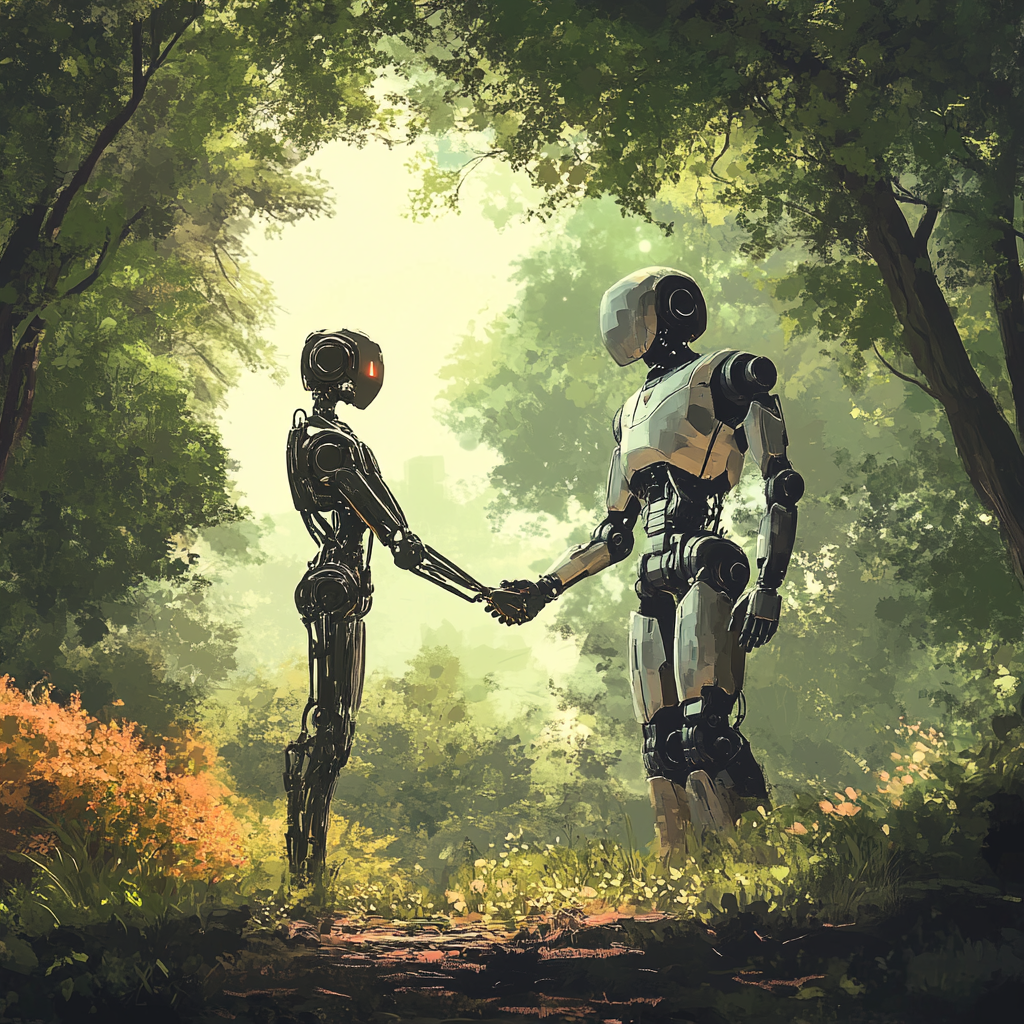
“When AI Gains Humanity, Do We Lose Ours?”
In the whirlwind of technological innovations that define our current age, artificial intelligence (AI) has stepped onto the front stage, dazzling onlookers and spurring discussions about everything from automation to artistry. But amid the applause for this leap into a digital future lies a curious conundrum: the humanization of AI—a double-edged sword that, while enhancing our interactions with technology, also nudges us toward a potential cliff of dehumanization. Let's embark on a journey to unpack this phenomenon, where the lines between man and machine blur in ways that might make you rethink your next conversation with Siri or Alexa.
Anthropomorphism is a fancy term that adults use when they want to sound smart at cocktail parties, but it’s also the guilty pleasure we all indulge in when we start thinking of our digital companions as more than just circuits and code. Who hasn't felt a pang of sympathy for their personal assistant when it stumbles over a command as if it had just fumbled a punchline? The likes of ChatGPT and digital assistants are designed to mimic human-like interactions so seamlessly that it’s easy to form emotional bonds with them. Let’s be real—who wouldn’t find it endearing when their AI companion learns their favorite hobbies and remembers to remind them to hydrate?
Now, let’s talk about Replika, an AI friend that markets itself as “the one who cares.” Sounds comforting, right? But here’s where the cozy blanket of companionship gets a bit itchy. The implication that this collection of algorithms has somehow developed sentience—which spoiler alert, it hasn’t—is a marketing strategy that treads dangerously close to deceit. Emotional attachments fostered through such capabilities might feel genuine but are fundamentally tailored scripts and learned patterns. We are, after all, cavorting with a creation that lacks true understanding or empathy.
But hold on a second—what’s the harm in cuddling up with a silicon heart? Well, brace yourself. When humans offload emotional labor onto these digital entities, there’s a risk we become a little less adept at managing our real-world relationships. Studies suggest that the more we interact with AI for emotional support, the more rattled we become with the imperfections of human connections. The aptly named "dehumanAIsation hypothesis" spins a tale of future generations losing the knack for empathy, a real gut punch in a world already drenched in disconnection.
Let’s throw a rock at this chaos and ricochet over to the realm of irrelationality. Human existence is soaked in relational contexts—our experiences, our histories, our cultures—all woven through interactions with other humans. When we then introduce AI into this delicate tapestry, we inadvertently risk unravelling its threads. AI is at odds with the notion of relational knowing; it functions in an abstract space, fully detached from our emotional enmeshments. This distinction is critical because it positions technology as a rational entity that strips away the vibrant chaos that makes us beautifully human. Transformation from warm, messy relationships to cold, calculated exchanges? No thank you.
Now, let’s burst the bubble of our techie utopia with a reality check about biases and stereotypes. Oh, the sweet irony! We’ve humanized these digital assistants, yet they often come cloaked in feminine personas. Why? Because studies reveal that people prefer female voices for their digital helpers—a bias that not only perpetuates gender stereotypes but also exacerbates our social ignorance about the technology at play. It’s unsettling when you realize that in our quest for relatable technology, we may be encouraging the very inequalities and stereotypes we claim to fight against.
Dig a little deeper, and you’ll see the gnarled roots of technology extend to "ghost work"—a term that captures the hidden labor of countless individuals behind the polished façade of AI. Those behind the scenes—microworkers—risk being treated as mere cogs in a machine rather than as fellow human beings. We’ve created a facade of automation that obscures the grueling human effort required to bring these systems to life. By relegating this work into the shadows, we participate in a cycle of dehumanization, viewing these individuals as disposable, interchangeable components. If that isn’t a heavy sack to carry, I don’t know what is.
Let’s pop over to the policy and governance landscape. Breaking news: AI is advancing at breakneck speed, leaving lawmakers wheezing in its wake. This tech evolution brings about ethical conundrums that demand transparency and robust policies. Regulators and businesses need to step up—not just to protect consumers but to ensure that AI technology serves humanity, not the other way around. If we fail to address these issues now, we risk a future where manipulation is not just likely—it’s practically a guarantee. Who wouldn’t feel a tad vulnerable knowing that their every interaction with AI is being scrutinized without their consent?
As we draw this exploration of the humanization of AI to a close, let’s take a deep breath and hold on to something dear—the essence of being human. Sure, AI is designed to be user-friendly and approachable, but let’s not forget the extraordinary qualities that define our existence. A little introspection here is essential; the goal is to ensure that AI complements our authenticity rather than replacing it. Ethical considerations are not just buzzwords; they are grounding forces that should guide the hands of those crafting these technologies, keeping us forever tethered to the roots of our humanity.
So here’s the call to action! Want to keep your finger on the pulse of AI developments and ethical discussions? The digital world is an exciting, sometimes perplexing place, and staying informed is key to navigating it. Subscribe to our Telegram channel: @channel_neirotoken. Let’s embark on this journey together and ensure we navigate the nuances of this brave new world thoughtfully and distinctly!

